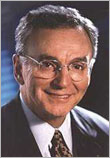|

Remarks

 |
Dr. Joseph Bordogna
Deputy Director
Chief Operating Officer
National Science Foundation
Biography
NSF Distinguished Teaching Scholars
NSF - Stafford II
Arlington, VA
January 7, 2004
|
Good morning everyone and welcome to NSF. I hope you all enjoyed the holidays
and that you're still in the festive spirit. I first want to express my
gratitude for the tremendous service you are providing.
So let me begin by thanking you, the reviewers, for coming here
and volunteering your time to select the (2004) nominees of NSF's
Director's Award for Distinguished Teaching Scholars.
All of us at the National Science Foundation are delighted that
such an illustrious group of reviewers has agreed to participate
in the process. Your expertise will prove invaluable in selecting
the 2004 nominees. The dedication and good judgment of each and
every one of you is essential to the continued success of this
program.
The Director's Award for Distinguished Teaching Scholars honors
outstanding individuals who have made a significant impact on both
research in science, engineering mathematics, or technology and
the enhanced education of undergraduates. The award is intended
to enhance an academic culture of excellence in research and education
and the creative integration of the two. It is the highest honor
bestowed by NSF for excellence in both teaching and research.
Throughout NSF's history, the integration of discovery and learning
has been a defining characteristic of our investments.
The NSF strategic plan is focused on the goal of investing in
people, ideas, and tools, which are the mission elements that support
the creation, integration, and transfer of knowledge by academe.
The Plan details three core strategies: developing intellectual
capital, integrating research and education, and promoting partnerships.
The Distinguished Teaching Scholars' awards exemplify these goals
and strategies.
Through the DTS program, NSF has supported the efforts of some
of the nation's most gifted and inspiring individuals. Past recipients
have brought enormous excitement and a richness of discovery to
their students. They have distinguished themselves through research
in astronomy, electrical and computing engineering, tectonics,
mathematics, cognitive science, and materials science. They have
also developed imaginative teaching applications areas such as
multimedia visualization, online resources for the study of fractal
geometry, and spectroscopy and photochemistry to teach chemistry.
A recipient of the 2003 award who is here with us today, Chris
Rogers, used robotic LEGOS, Steinway pianos, and reduced gravity
environments to engage students from kindergarten through college
in engineering concepts and education.
This year's nominees are equally talented. They are noted for
their achievements in diverse areas that reflect the NSF supported
fields of Biology, Geosciences, Computer Science, Engineering,
Math and Physical Sciences, and Social and Behavioral Sciences.
Since the DTS program began in 2001, a total of 19 scholars have
been named. This year NSF received 89 nominations, more than twice
the number submitted last year. We at NSF are delighted with the
increasing success of the program.
The DTS program aims to recognize leaders in their respective
fields who have integrated research and education in science and
engineering and who demonstrate the potential for continued leadership.
As we strive to find new ways to attract students to science and
engineering, the DTS program is critical to our efforts.
That makes your role today all the more important. You are helping
us identify stellar individuals, who will ultimately receive DTS
awards. This reviewing process will definitely call upon your own
powers of creativity and insight.
This is not an easy job for any of you. The process is as competitive
as any at NSF, so I greatly appreciate the time and expertise you
are devoting to the task. Without you, the Foundation could not
run one of its most vital programs.
As you review the proposals, keep in mind the goals of the DTS
program. It aims:
- to invest in the integration of research and education and integrate
diversity into NSF programs, projects, and activities;
- to foster the development of intellectual capital by identifying
outstanding individuals with a history of substantial impact
in science, engineering, mathematics, and technology research
and in educating undergraduate students and K-12 teachers and
students;
- to encourage the integration of research and education by providing
resources that these exemplary educators can use to explore
new ways of engaging students to research activities;
- to enable instructors to share their experiences with, and
mentor, other faculty who strive to improve their integration
between their research and their teaching;
- to promote an academic culture that values and rewards members
of the academic community who contribute to both disciplinary
scholarship and the education of undergraduates, including students
majoring in non-scientific disciplines;
- to publicize the scholar's influence so that dual efforts in
teaching and research by other faculty will be rewarded; and
- to recognize the efforts of institutions of higher education
that commit resources in support of faculty who effectively contribute
to both disciplinary-related scholarship and science education.
I won't hold you any longer because I know you have an important
job to do, and I know how anxious you are to get started. We're
all excited to see the results.
Thank you, again.

Return to a list of Dr. Bordogna's speeches.
|











